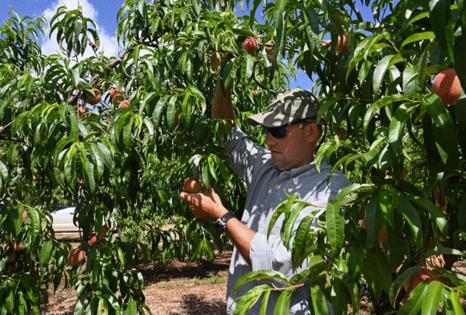After disastrous 2023, a 'bumper' crop of Georgia peaches is coming
Published in Business News
In the 130 years Lawton Pearson’s family has been growing peaches in Middle Georgia, few harvests have been as disappointing as last year’s, when his crop — and most others in the state — were almost entirely wiped out by two March cold snaps.
Trees covered with quarter-sized fruit and delicate pink flowers were blasted by last year’s freezes, leaving the promise of an ample harvest to rot, prompting the federal government to declare a disaster across the heart of Georgia’s peach country.
But this year has been the “exact opposite,” Pearson said, giving farmers and fruit lovers across the Peach State reason to rejoice. Aided by a relatively cool winter and a deep freeze-less spring, Pearson said a “bumper” crop of Georgia’s trademark peaches should be heading to grocery stores and farmers markets soon.
“We’re all excited to tackle this beast of a crop that we get to pick,” said Pearson, a fifth-generation peach farmer and co-owner of Pearson Farm near Fort Valley, about 30 miles southwest of Macon.
The peach rebound was hailed by Georgia Agriculture Commissioner Tyler Harper who said “consumers in Georgia and across the country, can look forward to enjoying a great crop of our iconic Georgia peaches very soon.”
Agriculture remains Georgia’s top industry. Peaches aren’t Georgia’s most valuable agricultural product — that would be broiler chickens — nor is Georgia the nation’s top peach producer, having been surpassed long ago by California. But Georgia is still proudly known as the Peach State.
Peaches and blueberries, which are now the state’s most valuable fruit crop, both depend on a mix of hot and cold temperatures for successful harvests. But as human-caused climate change pushes average temperatures up in Georgia — especially in winter — it is disrupting the delicate balance plants and growers depend on. The result has been massive crop losses in recent years.
Peaches and blueberries need to spend a certain amount of time in temperatures between 32 and 45 degrees for healthy buds and fruit to emerge when warmer temperatures arrive. Conversely, an abnormally warm winter can trick plants to awaken from dormancy early, putting them at risk of damage if freezing temperatures return.
That’s exactly what doomed the state’s peach crop last year.
Egged on by Georgia’s warmest winter on record to start 2023, most peach trees in the state had full blooms or even small fruit out by mid-March, when back-to-back freeze events struck. The result was devastating — many peach growers lost 90% or more of their crop.
...continued
©2024 The Atlanta Journal-Constitution. Visit at ajc.com. Distributed by Tribune Content Agency, LLC.







Comments